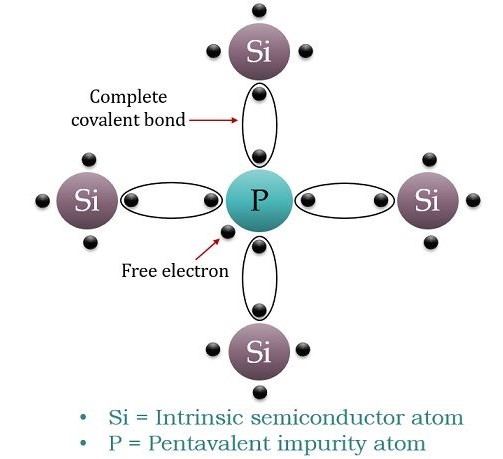The pentavalent impurities provide extra electrons and are termed as donor atoms. It uses gallium so that electrical conduction is due to the movement of electrons.
![]()
I P Type N Type Semiconductors Engineering Libretexts
Which best describes an example of a p-type semiconductor.
. Density of states a. Creation of free electrons and holes in an n-doped semiconductor with temperature above absolute zero. When a small amount of Pentavalent impurity is added to a pure semiconductor providing a large number of free electrons in it the extrinsic semiconductor thus formed is known as n-Type Semiconductor.
Techniques of doping and synthesis The synthesis of n-type semiconductors may involve the use of vapor-phase epitaxy. So a spare electron is produced. D It uses boron so that electrical conduction is due to the movement of electrons.
Which best describes an example of a p-type semiconductor. Examples of pentavalent impurities are Arsenic Antimony Bismuth etc. 0 It uses phosphorus so that electrical conduction is due to the movement of electrons.
A it uses arsenic so that the electrical conduction is due to the movement of electrons. An n-type semiconductor is one in which the impurity added produces more extra electrons available for conduction eg. The majority carriers in a p-type semiconductor are holes.
N-type semiconductor 3 Figure 2. Silicon having 4 electrons in its outer shell while phosphorous has 5 electrons. Which of the following is true about this band diagram.
Which best describes an example of an n-type semiconductor. Electrons are the majority charge carriers in n-type. The conduction in the n-type semiconductor is because of the free electrons denoted by the pentavalent impurity atoms.
The semiconductor whose increased conductivity is a result of negatively-charged electrons is called an n-type semiconductorWhen the crystal of a group 14 element such as Si or Ge is doped with a group 15 element such as P or As an n-type semiconductor is. An extrinsic semiconductor which has been doped with electron donor atoms is called an n-type semiconductor because the majority of charge carriers in the crystal are negative electronsSince silicon is a tetravalent element the normal crystal structure contains 4 covalent bonds from four valence electrons. Which best describes an example of a p-type semiconductor.
The low lands i believe. Answer Dit uses boron so that electrical conduction is due to the movement of positive charge. C it uses boron so that electrical conduction is due to the movement of electrons.
N-type and p-typeA p-type semiconductor is one in which the impurity added produces extra holes available for. Phosphorous P in silicon. ExplanationA semiconductor is a substance whose resistivity is between that of a good conductor and a good insulatorThere are two types of semiconductor.
Each atom requires 8 electrons in its valence shell to be stable. I n-type semiconductor ii p-type semiconductor n-type semiconductor. B it uses arsenic so that electrical conduction is due to the movement of a positive charge.
The two main types of semiconductors are. All of the above use low power fast switching reliable economic. In vapor-phase epitaxy a gas.
Which of the following statements best describes semiconductors. Shaded areas represent electron-filled levels. N-type Semiconductor Example An intrinsic semiconductor material like Silicon Si has 14 electrons with a configuration of 284 and Germanium Ge has 32 electrons with a configuration of 28184.
Why are semiconductors valuable in modern electronics. A P-type semiconductor uses boron so that electrical conduction is due to the movement of electrons. In an n-type semiconductor pentavalent impurity from the V group is added to the pure semiconductor.
It uses gallium so. It uses phosphorus so that electrical conduction is due to the movement of a positive charge.
What Are Intrinsic Semiconductors Explain How A Semiconductor Can Be Converted Into An N Type Semiconductor Quora


0 Comments